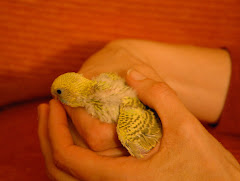
I recently heard veterinarian Patricia McConnell on the Diane Rehm show. Patricia McConnell co-hosts a show “Calling all pets” (where mostly cats and dogs are discussed). I enjoy her show and something she said on the Diane Rehm show resonated with me in particular. To paraphrase, she said that she tries not to anthropomorphize her dog(s), but rather, enjoy their wonderful “dogness”. I think that one of the joys of observing animals, including pets, is to think about what it is like to be them. Sometimes people ask: are budgies smart? And I answer, “they may not be very good at being people, but they are expertly skilled and brilliant when it comes to being budgies.” As I have noted, budgies priorties seem to be: the highest perch, the flock, and millet seed (or other treats). These are NOT human priorities. When Sutcliffe feeds Mary ann, it is really “sweet”. However, we cannot assume he has affection for her as our monkey brains would understand it. Sutcliffe is a “good father” in that he sacrifices everything in order to feed Mary ann, and in the past, the young. Mary ann is a “good mother” in a similar way. However, when we project human motives and emotions onto budgies, we lose a chance to enjoy their true “budgieness” which is very fascinating. J. asked, “do you think Sutcliffe wishes he has arms”? That is a very interesting question. Sometimes I wish I had wings, but, I would not give up my hands for them. I really do wonder what Sutcliffe would say.
Conversely, sometimes we enjoy anthropomorphizing. “Cute overload” is one of the best, (and sometimes, worst), examples of that. It is interesting to see ourselves in our pets. Part of this is biological, perhaps, as transference of our desire to love and nurture our own young. Part of it helps us feel companionship from our pets. Some of it may be true: evolution has preserved a number of behaviors across species, especially, species that live in groups (be it flocks, tribes, or packs). It may be reverse anthroporhism to say that I feel that we (K, J) are human members of their flock. We probably wouldn't make very good budgies, though. I guess that means, the budgies would view us as flawed, limited flock members. Hopefully, they "like" us, in their own budgie way, nonetheless.







4 comments:
We humans probably share a good bit of our genetic material with budgies. So, maybe some of the behaviors that we are "anthropomorphizing" (or should I say "zoomorphizing"?) are actually shared. Plus, maybe we instinctively want to protect that shared portion of genes. It's probably a lot easier to reach an understanding with a budgie than it would be to communicate with extraterrestrial intelligences.
thanks for the comment! I wonder if budgies would be a good liaison between us and extraterrestrials? If those beings traveled in flocks, perhaps so.
I once read an article where a biologist tried to solve the ratio problem
extraterrestrials : humans :: humans : ?
and found
? = clams
This would suggest that either we should use, as our liasons with flocking ETs,
flocking clams; or that the search for extraterrestrial intelligence can't be reduced to a ratio problem.
I think that the article was in American Scientist but I can't find it after searching for 15 sec.
Budgies would probably be great liasons with dinosaurs that travel in flocks!
I bet dinosaurs DID travel in flocks. How else to explain bird behavior? And--do you think flocks of clams fight for the best perch?
LK
Post a Comment